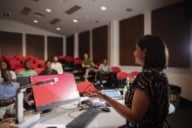You have /5 articles left.
Sign up for a free account or log in.
Just over a decade ago, a small group of academics started a political science blog called the “Monkey Cage.” In an inaugural post, the academics wrote that they were tired of political science research being overlooked by the media and policy makers, and set out on a mission to get more people interested in their research.
It worked. In the following years, the blog's pool of contributing authors grew substantially. It won awards. And in 2013, the blog attracted the interest of The Washington Post, resulting in a three-year hosting deal.
At the time, the reaction from “Monkey Cage” readers was mixed. Many were supportive, but others had concerns about how moving to the Post might affect the blog’s content, and some didn’t like that the content would be placed behind the Post’s paywall.
Speaking to Inside Higher Ed, John Sides, a co-founder of the blog and associate professor of political science at George Washington University, admitted the blog might have lost some of its original readers to the Post’s paywall, but he said the story of its move to the Post was ultimately one of “unprecedented growth.”
The blog now has “more contributors, more funding, more audience,” than ever before, Sides said. At the Post, “Monkey Cage” receives more views on a daily basis than even the most popular posts at the old blog did, including those written at the peak of the 2012 election. The blog signed a second two-year deal with the Post in 2016, and its creators hope to stay there.
The blog’s content has shifted over time. It's more layperson friendly, but it still maintains a solid research foundation, said Sides. “The Post didn’t want us to change our stripes,” he said. The articles are more reactive to the news cycle than they used to be, and the blog consciously tries to attract a large audience by posting articles that are timely. In the last week, the blog has featured analyses on the prospect of a U.S. war with North Korea, protests in Iran and “Why Trump administration officials try so hard to flatter him.”
Publishing under the umbrella of a mainstream media outlet “does force you to work and write and plan in particular ways,” said Sides. “You have to figure out how to use the medium to its fullest extent. No one reading the Post on their phone is going to want to spend 20 minutes thumbing through 6,000 words.” While the blog has mostly stuck to its political science roots, academics who contribute to the blog now come from all over the world and have expertise in a much broader range of subdisciplines. There have been over 2,839 contributors to the blog since it moved the Post, 958 of whom who have written multiple times.
The blog has substantially expanded its editorial team since it joined the Post. Some early contributors are now editors rather than writers, and the team is supported by some experienced nonacademic editors. “They spot things that I would miss,” said Sides. Particularly the inclusion of academic jargon. As the blog has an independent contract with the Post, it still maintains editorial control, but copy is checked by Post employees to ensure it meets house style.
E. J. Graff joined “Monkey Cage” as managing editor over two years ago as a result of its “exponential growth.” Though she has frequently worked with academics in her career as an intellectual journalist, she is not an academic herself. She described her role as “watching the planes and making sure they don’t all land at the same time.” A big part of Graff’s job is ensuring the blog’s content is accessible to nonacademics. “It’s not listicles about ‘Five things you didn’t know about Steve Bannon’ -- it is still very intellectual.”
The blog editors receive so many submissions that they rarely have to seek out content, but sometimes they solicit posts on newsworthy topics, said Sides. “Scholars are willing to write for us at the drop of a hat,” he said. In this sense, the blog has become more of a publishing platform for academics than a traditional blog.
“It’s a different animal now,” said Joshua Tucker, a “Monkey Cage” editor and professor of politics at New York University. Asked to reflect on what had changed at the blog, Tucker said he did miss some aspects of the old format -- the informality, the engagement in niche academic debate -- but what the blog does now is “incredibly valuable,” he says. “It’s become such a public good for the discipline.”
Tucker said the blog provided a “truly unique” opportunity to academics who “wake up and realize their work is relevant.” Tucker said he was particularly proud of the blog’s coverage of international elections, conflict in Ukraine and the Arab Spring. “In the past, if you had something to say, you might write an op-ed, and it would likely be rejected,” said Tucker.
In terms of impact, blog content has been cited in Supreme Court decisions and referenced in speeches from prominent politicians, though Sides said he would be reluctant to draw a straight line between content on the blog and policy decisions. For individual academics, the blog is a real opportunity to share their expertise with the public and get eyeballs on their research. Chris Gilson, the managing editor of the “American Politics and Policy” blog at the London School of Economics and Political Science, said that frequently academics are offered speaking engagements on the strength of blog posts they write, but that such activities might not be counted toward tenure.
Gilson, a long-term reader of “Monkey Cage,” said that he was a fan of the blog, but not of the paywall, as he felt it restricted access to what is often publicly funded research. Another academic blog hosted by The Washington Post, called “The Volokh Conspiracy,” recently left the Post to a paywall-free spot at Reason.com. Writing on the decision, founder Eugene Volokh said the blog, which covers legal and political issues from a libertarian perspective, had enjoyed four “mostly very happy years” at the Post, but was principally moving to “be freely available to the broadest range of readers.”
While academic political science blogs like Duck of Minerva and Crooked Timber have remained as stand-alone productions, others, like, “Mischiefs of Faction,” which is hosted by Vox, seem to sit happily at mainstream publications. With such a move, Gilson said that sometimes blogs were at risk of losing some of their identity. “I liked the orangutan, it was quirky,” said Gilson, referencing the original web design of “Monkey Cage.” That said, Gilson understands why the blog moved. “I’m not sure I would say no if the Post came knocking at my door,” he said.
Asked how much time he spends working on “Monkey Cage,” Sides said he didn't “want to add it up.” But despite the extra work the blog’s expansion demands, Sides said working with the Post had been a “great opportunity.” Asked if, on reflection, there was anything the blog should have done differently, Sides hinted perhaps he would have chosen “a less silly-sounding name.”








